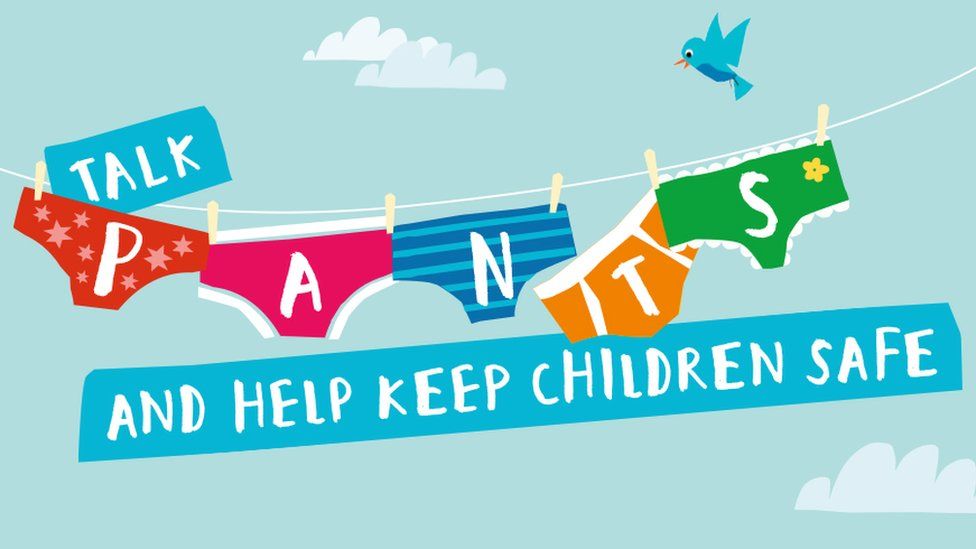How do you talk to your children about sexual abuse?
- Published

Allegations of sexual abuse in football have raised concerns about children's safety. But how and what should parents say about sexual abuse without frightening their children?
"Parents shouldn't leave it up to teachers," says Jon Brown, head of the NSPCC's sexual abuse policy.
The risks are real and parents should have "simple conversations" with their children from the age of five right through to adulthood, he says, adding that "children who have the words to speak are less likely to be abused".
"Bath-time, walking home from school or in the car are all opportunities to have that first talk.
"Avoid scary words but say that their body belongs to them, and that they can say no if someone tries to touch them."
Stranger danger
Dr Nina Burrowes, a psychologist who specialises in child sexual abuse, says parents often cling to the "myth of stranger danger" and teach their children to be wary of people they don't know.
But "what if the perpetrator is someone they do know?" she says.
The most common form of abuse comes from within the family and it can come from someone who is well-known and trusted in the community.
She says parents should talk about sexual abuse in the same way they teach their children about bad behaviour.
- Introduce the subject by saying "can I talk to you about this - because it's important to me"
- Approach the conversation in the same way you would teach children how to play with others and explain where it is ok to touch people
- Tell them the difference between a "good secret" - like a surprise party - and a "bad secret" - one which you can never tell anyone
Talking pants
The message "keep your pants private" may be something that sounds familiar to parents of primary school-age children. The NSPCC's Talk Pants campaign uses the message:
- P - Privates are private
- A - Always remember that your body belongs to you
- N - No means no
- T - Talk about secrets that upset you
- S - Speak up, someone can help
"It doesn't mention sex or abuse, it's fairly fun," the NSPCC's Jon Brown says. "This makes a scary message easier to speak about."
It is not compulsory for schools to teach lessons about sexual abuse and while many teachers say they are "aware of the importance" of arming children, many do not feel they have the right training.
The NSPCC recommends parents access the campaign online or use bed-time stories to tackle the issue.
Gemini, a primary school-age child in the book Whisper, is one character designed to help with this. Gemini finds a monster in the garden but "feels like the monster had to be hidden or people might be angry".
Like Pants, it doesn't mention abuse or sex, but by concealing a secret it touches on the feelings a child victim might have.
"I desperately wanted a resource parents can use without frightening children," says Michelle Denny-Browne of One in Four, the abuse survivors' charity that published the book.
"Sometimes children just feel funny and this book speaks in their language," she says.
Sex abuse in figures
- More than 90% of abuse cases involve someone the child already knows, such as a family member or close friend
- Police recorded 47,008 sexual offences against children in the year to April 2015
- This is a 29% rise on the previous year and the highest rate recorded in a decade
- More than 11% of young adults aged 18 to 24 have experienced contact sexual abuse during childhood
Source: NSPCC
How to talk to older children
The language of pants and monsters may not be relevant to children as they become more sexually aware and get freedoms online but experts say the conversations should not stop.
"Parents should keep talking about sex abuse right through to university-age," Jon Brown says. "Issues like sexual consent and harassment are only recently being recognised as a problem by universities."
Tom Squire, from the campaign Stop it Now!, says parents should talk about the dangers posed by smartphone and internet use.
"Another school pupil could be a potential abuser, especially if a child has been persuaded to share naked pictures or is sexting."
Talk to teenage children about it by referencing a celebrity who has recently shared naked photos, he suggests.
Or, use an embarrassing story from your childhood as a cautionary tale.
"We've all done reckless things as children," he says. "But explain that online behaviour can be shared and saved permanently."
But he adds it is important not to "shame" a child's behaviour if they do something wrong online.
"If they feel they're likely to be punished or ashamed, they're less likely to come and talk about it."
Helplines for children and parents
- Childline - 0800 1111 - for children to access advice or talk to a counsellor
- Stop it Now! - 0808 1000 900 - for parents to asks questions or raise concerns